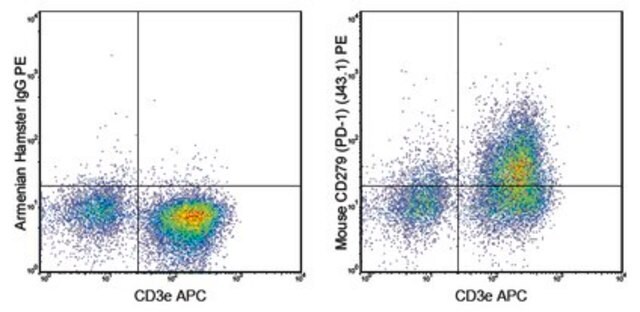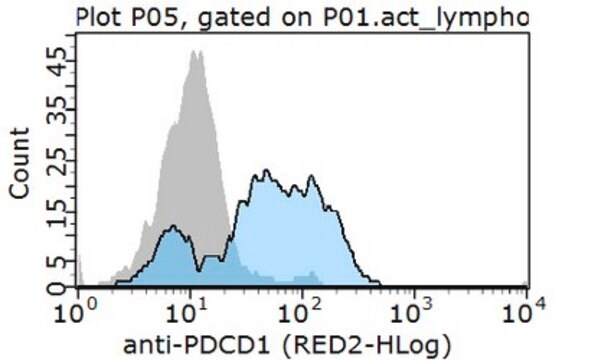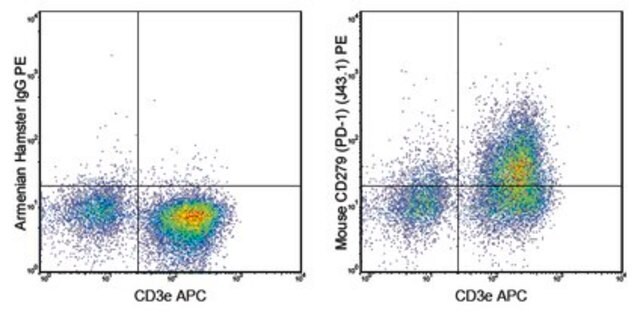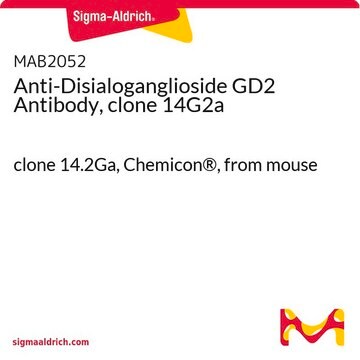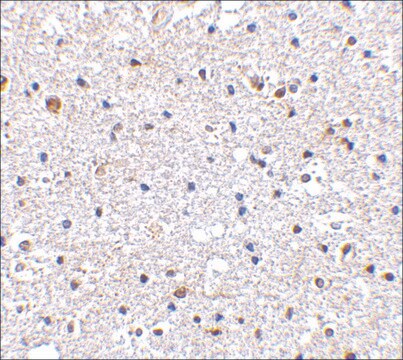おすすめの製品
由来生物
hamster (Armenian)
抗体製品の状態
purified immunoglobulin
抗体製品タイプ
primary antibodies
クローン
G4, monoclonal
交差性
mouse
包装
antibody small pack of 25 μg
テクニック
flow cytometry: suitable
NCBIアクセッション番号
UniProtアクセッション番号
ターゲットの翻訳後修飾
unmodified
遺伝子情報
mouse ... Pdcd1(18566)
詳細
Protein PD-1, mPD-1, CD279) is encoded by the PDCD1 (also known as PD1) gene (Gene ID: 18566) in murine species. PD-1 is a monomeric inhibitory cell surface receptor involved in the regulation of T-cell function during immunity and tolerance. PD-1 is synthesized with a signal peptide (aa 1-20), which is subsequently cleaved off. The mature form contains an extracellular domain (aa 21-169), a transmembrane domain (aa 170-190), and a cytoplasmic domain (aa 191-288). PD-1 also contains a single N-terminal immunoglobulin variable region (IgV) like domain (aa 31-139). PD-1 and its ligands, PD-L1 and PD-L2 play a key role in the maintenance of peripheral tolerance, a process by which the quiescence of autoreactive mature T cells is maintained. However, tumors and pathogens that cause chronic infections can exploit this pathway to escape T-cell mediated tumor-specific and pathogen-specific immunity. The effector functions of T-cells expressing PD-1 can be downregulated by PD-L1 or PD-L2 expressed by the tumor cells. PD-1 lacks SH2- or SH3-binding motifs on its cytoplasmic tail, but contains the N-terminal sequence VDYGEL that forms an immunoreceptor tyrosine-based inhibition motif (V/I/LxYxxL), which recruits SH2 domain-containing phosphatases. The cytoplasmic tail also contains the C-terminal sequence TEYATI, which forms an immunoreceptor tyrosine-based switch motif (TxYxxL). PD-1 ligation is reported to inhibit the activation of T-cell receptor proximal kinases, which results in attenuation of Lck-mediated phosphorylation of ZAP-70 and initiation of downstream events. PD-1 is also reported to impair the activation of the MEK-ERK MAP kinase pathway by inhibiting activation of PLC- 1 and Ras.
特異性
Clone G4 is an Armenian Hamster monoclonal antibody that specifically detects PD-1 in murine cells.
免疫原
Murine PD-1Ig fusion protein.
アプリケーション
Affects Function Analysis: A representative lot detected PD-1 in Affects Funtion applications (Dronca, R.S., et. al. (2016). JCI Insight. 1(6); Hirano, F., et. al. (2005). Cancer Res. 65(3):1089-96; Overacre-Delgoffe, A.E., et. al. (2017). Cell. 169(6):1130; Tsushima, F., et. al. (2006). Blood. 110(1):180-5).
Flow Cytometry Analysis: A representative lot detected PD-1 in Flow Cytometry applications (Hirano, F., et. al. (2005). Cancer Res. 65(3):1089-96).
Flow Cytometry Analysis: A representative lot detected PD-1 in Flow Cytometry applications (Hirano, F., et. al. (2005). Cancer Res. 65(3):1089-96).
Detects Programmed cell death protein 1 using this armenian hamster monoclonal Anti-PD-1, clone G4, Cat. No. MABC1132, testted for use in Flow Cytometry and Affects Function.
品質
Evaluated by Flow Cytometry in EL4 T lymphoma cells.
Flow Cytometry Analysis: 1 µg of this antibody detected PD-1 in 1X10E6 EL4 T lymphoma cells.
Flow Cytometry Analysis: 1 µg of this antibody detected PD-1 in 1X10E6 EL4 T lymphoma cells.
ターゲットの説明
~31.84 kDa calculated.
物理的形状
Format: Purified
その他情報
Concentration: Please refer to lot specific datasheet.
適切な製品が見つかりませんか。
製品選択ツール.をお試しください
試験成績書(COA)
製品のロット番号・バッチ番号を入力して、試験成績書(COA) を検索できます。ロット番号・バッチ番号は、製品ラベルに「Lot」または「Batch」に続いて記載されています。
Ti Wen et al.
Cancer immunology research, 10(2), 162-181 (2021-12-17)
Cytotoxic CD8+ T cells (CTL) are a crucial component of the immune system notable for their ability to eliminate rapidly proliferating malignant cells. However, the T-cell intrinsic factors required for human CTLs to accomplish highly efficient antitumor cytotoxicity are not
Chunhua Chen et al.
JCI insight, 6(8) (2021-04-23)
Although the immune checkpoint role of programmed death ligand 1 (PD-L1) has been established and targeted in cancer immunotherapy, the tumor-intrinsic role of PD-L1 is less appreciated in tumor biology and therapeutics development, partly because of the incomplete mechanistic understanding.
ライフサイエンス、有機合成、材料科学、クロマトグラフィー、分析など、あらゆる分野の研究に経験のあるメンバーがおります。.
製品に関するお問い合わせはこちら(テクニカルサービス)